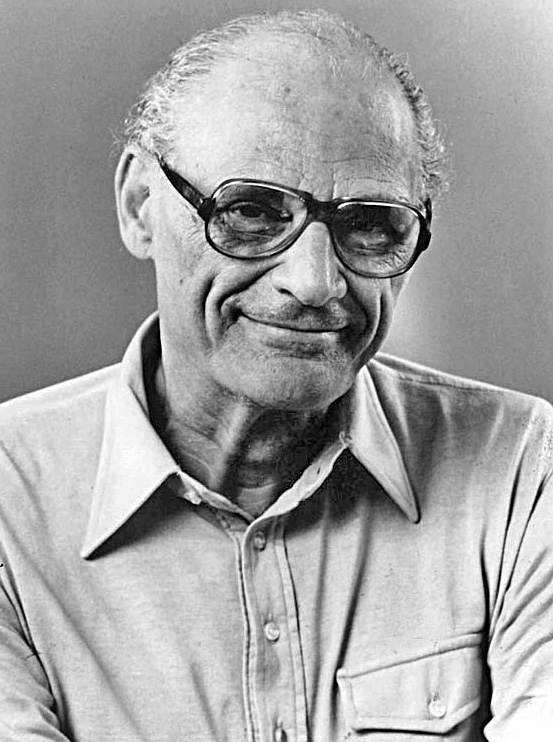
Heralding the Paris premiere of Arthur Miller's Le dessaroi de M. Peters (known in English as Mr. Peters' Connections), an interview with the author, director and star of the play drew an overflow crowd to multi-story, multi-media purveyor FNAC, rue Saint-Lazare, as October began. Miller seemed joyful not only because of the "attention being paid" to his appearance, but because he hadn't been able to get to France to witness the great success The Crucible had in its McCarthy era debut there. "I couldn't leave the U.S.A. at the time."
After a synopsis of his early career and his political troubles, Miller simply commented on the American system as "cruel to failure but extremely generous to those who succeed." He seemed anxious to talk about the play just opened as well as to answer those who believe it basically autobriographical. "Mr. Peters is not as old as I am. He's only 65." Quickly, said the 87-year-old, both looking and sounding robust, "It's probably my contemplation of life as an old man. But it's not me. He's had many different experiences -- being a pilot, for instance, and a different personality."
Mr. Peters also, Miller emphasized, "had dozens of women. Malheueusement, he has lost his memory. [A smile.] So all he remembers of it is in this play." Director Jorge Lavelli, who'd seen the play in New York, liked the main character and felt the form was typically "American tragedy" with dream as reality. Michel Aumont, was happy his "old pal Lavelli" gave him a chance to do a play "by the great American author." Aumont described it as "impressionistic. Like sex, you're always sad when it's over."
By coincidence, Miller was in Paris on "the" September 11th. Asked by a caller from Germany to turn on TV, he thought it was a Hollywood movie, and I thought what a wonderful job it was and it would disappear in the air." His daughter was wheeling a baby carriage four blocks away from the Twin Towers. "Psychologically, it's been difficult for everyone," said the native New Yorker, "and politically."
"I never write directly from the news. These things -- you eat them -- but it takes a while to digest." In his last play, Resurrection, Miller wrote a line about "`understanding death in New York now' -- and I don't know how I wrote that three years ago."
He doesn't write from an "intellectual urge" but from "interior dialogue." In the case of Mr. Peters, "I wished basically to write a naked drama...to create a human being by way of his memories...not as a drama." He used "distinct, sharp details that would recreate a human being, not in the form of a usual story."
Mr. Peters "keeps asking: `What's the subject?' Maybe it comes down to he's capable of loving...a person...existence."
Continued Miller, referring to his first play, The Man Who Had All the Luck, "After all these years, I see the power of chance. I started my playwriting career by writing about luck. At the end, I find I'm writing about chance. So much I recall is the result of chance encounters and accidental events...chance is powerful.... What CAN happen...this makes the adventure possible."
Lavelli seemed to understand this about Miller's Peters. "I don't usually compliment a director to his face. It makes life difficult afterward," Miller said of Jorge Lavelli. But Miller found Lavelli's production "fantastic...musical. Like a dance. And this man [he pointed to Michel Aumont] is a great actor. [Applause from the crowd.] I saw the play in New York and in London. Then I sat in the audience here and I thought: at last I've met Mr. Peters. And he's speaking French!"
Aumont's comment: "I hope I found the right accent!"
"A wonderful thing" is how Miller described Michel Aumont creating "a state of tension while being relaxed on stage....He speaks of `nothing' things with the passion of great tragedy!" It might be the "simple memory" of something such as a banana but his "passion is immense!"
Two subjects Miller couldn't avoid. Of the political situation in America, he came down against war with Iraq on the basis of "present evidence." However, there are "so many complications, it's hard to figure possible scenarios. A fanatic releasing gas in a subway could change everything." He pointed to Saddam's lack of experience of the world outside Iraq, "very remote from our own psychology." As for opposing the war, "I hold my breath and wait for the next morning's news."
The other subject, alluded to in a biographical rundown, was Marilyn Monroe. In reference to his being thrown into the world of films and Hollywood during their marriage, he said, "It's difficult to hold on to your own life in these situations."
His final words? "Inge Morath and I were married 41 years, and they were the best years of my life. What more can I say?"
[END]
